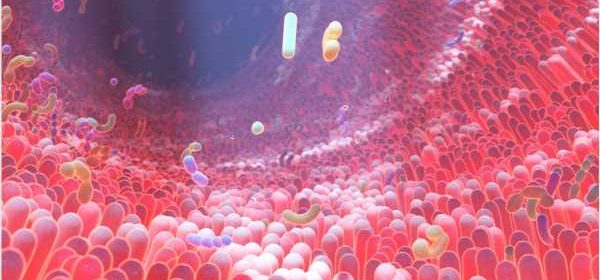Scientists identify gut microbiota dysbiosis as a potential risk factor for long COVID

A study in Norway has recently highlighted a significant association between gut microbiota alteration and persistent respiratory dysfunction in coronavirus disease 2019 (COVID-19) patients. The study reveals that altered diversity and composition of the gut microbiota together with increased plasma levels of lipopolysaccharide-binding protein (LBP) is associated with respiratory dysfunction in COVID-19 patients even after three months of hospitalization. The study is currently available on the medRxiv* preprint server.
.jpg)
Background
The severity of COVID-19, a novel disease caused by severe acute respiratory syndrome coronavirus 2 (SARS-CoV-2), primarily depends on the aberrant activation of the immune system and excessive systemic inflammation. Recently, the potential involvement of the gut microbiota alteration in the pathogenesis of COVID-19 has also been established.
The resident microbial community in the gastrointestinal (GI) tract plays a vital role in regulating local and systemic immune responses. In this context, some recent evidence has suggested the involvement of gut microbiota in mediating inflammatory responses in COVID-19 patients. Moreover, a link has been established between gut microbiota dysbiosis and the development of secondary systemic infections in COVID-19 patients.
In the current study, the scientists have investigated whether alteration in the gut microbiota could cause respiratory dysfunction in COVID-19 patients even after three months of hospitalization.
Study design
This study is a part of the NOR-solidarity trial, which is an independent add-on study to the World Health Organization (WHO) Solidarity trial investigating the efficacy of antiviral medicines in hospitalized COVID-19 patients.
A total of 181 hospitalized COVID-19 patients were enrolled for the study. Plasma samples were collected from the patients at admission and after three months of hospitalization. The markers of gut barrier dysfunction and inflammation were analyzed in the plasma. At the 3-month follow-up, the diffusion capacity of the lungs for carbon monoxide was assessed to determine pulmonary dysfunction. Moreover, rectal samples were collected and analyzed for the gut microbiota composition.
Important observations
Of 181 enrolled patients, 149 completed the 3-month follow-up. About 48% of patients were treated with antibiotics during hospitalization. Comorbidities including hypertension, diabetes, and obesity were present in 68% of patients. Only 6% of patients reported having chronic pulmonary disease.
The gut–lung axis
At the 3-month follow-up, pulmonary dysfunction was observed in 30% of previously hospitalized COVID-19 patients for whom the rectal sample and lung function measurements were available. Moreover, these patients exhibited reduced diversity and altered composition of the gut microbiota. Importantly, no significant impact of antibiotic consumption on gut microbiota alteration and pulmonary dysfunction was observed in these patients.
The findings of the taxonomic analysis revealed that the patients with pulmonary dysfunction after three months of hospitalization are significantly associated with a reduced abundance of Erysipelotrichaceae UCG-003 (a microbe associated with butyrate production) and an increased abundance of Flavonifractor and Veillonella. The highest association was observed for Veillonella, which is an anaerobic opportunistic pathogen associated with tissue fibrosis.
Markers of gut barrier dysfunction
A connection between gut barrier dysfunction and acute respiratory failure was established in the study.
During hospitalization, about 33% of patients presented with acute respiratory failure. In these patients, a significant association was observed between increased plasma levels of LBP and respiratory failure. According to the available literature, an increased leakage of LBP from the GI tract can result from severe SARS-CoV-2 infection, which subsequently can increase COVID-19 severity by aberrantly activating the innate immune system.
While the LBP level showed a persistent elevation during hospitalization and a gradual decline over time, the opposite was observed for another gut barrier dysfunction marker, REG-3α, which is a bactericidal C-type lectin with antibacterial properties.
In patients with pulmonary dysfunction after three months of hospitalization, the plasma LBP level remained high. Moreover, a significant association was observed between persistently elevated LBP levels and markers of systemic inflammation, including C-reactive protein level and neutrophil count.
Study significance
The study highlights a potential role of the gut microbiota in determining acute and persistent clinical consequences of COVID-19. As mentioned by the scientists, the gut–lung axis established in the study should be further investigated as a potential risk factor for long COVID.
*Important notice
medRxiv publishes preliminary scientific reports that are not peer-reviewed and, therefore, should not be regarded as conclusive, guide clinical practice/health-related behavior, or treated as established information.
- Vestad B. 2021. Gut microbiota alterations in patients with persistent respiratory dysfunction three months after severe COVID-19. medRxiv preprint server. doi: https://doi.org/10.1101/2021.07.13.21260412, https://www.medrxiv.org/content/10.1101/2021.07.13.21260412v1.
Posted in: Medical Science News | Medical Research News | Disease/Infection News | Healthcare News
Tags: Antibiotic, Carbon Monoxide, Chronic, Coronavirus, Coronavirus Disease COVID-19, C-Reactive Protein, Diabetes, Dysbiosis, Efficacy, Fibrosis, Immune System, Inflammation, Lungs, Obesity, Pathogen, Protein, Respiratory, SARS, SARS-CoV-2, Severe Acute Respiratory, Severe Acute Respiratory Syndrome, Syndrome

Written by
Dr. Sanchari Sinha Dutta
Dr. Sanchari Sinha Dutta is a science communicator who believes in spreading the power of science in every corner of the world. She has a Bachelor of Science (B.Sc.) degree and a Master's of Science (M.Sc.) in biology and human physiology. Following her Master's degree, Sanchari went on to study a Ph.D. in human physiology. She has authored more than 10 original research articles, all of which have been published in world renowned international journals.
Source: Read Full Article